Posts Tagged ‘commonplace book’
February 2, 2022 @ 10:08 am | Filed under:
Books 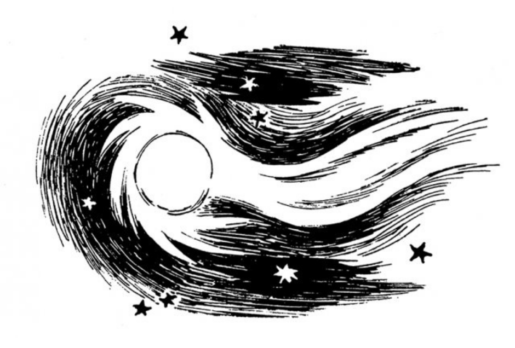
Comet in Moominland illustration by Tove Jansson
When I read the Moomins books aloud, I have to remember which voices I used for each character in our first reading many years ago. For some, that’s a piece of cake (I never have to wonder what Snufkin sounds like; Snufkin is immutably Snufkin), but sometimes a secondary character will pop up and I’ll have to ask, wait, what did the Muskrat sound like? And sometimes I’ll run through a few possibilities and the kids will say, There, that’s the one.
The Hemulen sounds like Eeyore, only British. I think of Moominmamma’s voice as low and soft, but I think it sounds lower inside my head than outside, because Scott says it sounds like Mrs. Banks in Mary Poppins. Votes for women!
Moomintroll is easy—he’s had the same enthusiastic timbre for a decade—but it was only this year that I suddenly realized what voice I’m doing for him. It’s my Hayley Mills voice—or more precisely, my version of the Hayley Mills impression Julia Sweeney does in one of her one-woman shows. “Girls,” she breathes, “I’ve got a scathingly brilliant idea!” That’s my Moomintroll. Excited, eager, delighted, always rallying his companions to adventure.
I was therefore mightily amused when, in a recent chapter, Moomintroll actually does say “I’ve got a brilliant idea!”
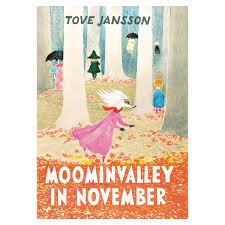 I’m a little vexed with myself over the Moomins, though. After a many-years stroll through the series, Huck and Rilla and I took up the final book, Moominvalley in November, last November (fittingly and deliberately). I hadn’t read that one before and it became one of my favorites, though it is markedly different from the rest of the series in tone and cast of characters. There were so many passages I wanted to share here. But a readaloud is the one time I can’t stop and make a note! I mean, I do occasionally, interrupting the narrative to ask Scott to Slack me a phrase—but I lose track of those messages and never seem to follow through on copying out the quote or noting a connection.
I’m a little vexed with myself over the Moomins, though. After a many-years stroll through the series, Huck and Rilla and I took up the final book, Moominvalley in November, last November (fittingly and deliberately). I hadn’t read that one before and it became one of my favorites, though it is markedly different from the rest of the series in tone and cast of characters. There were so many passages I wanted to share here. But a readaloud is the one time I can’t stop and make a note! I mean, I do occasionally, interrupting the narrative to ask Scott to Slack me a phrase—but I lose track of those messages and never seem to follow through on copying out the quote or noting a connection.

 After November, it was decided by unanimous vote that I should start all over again at the beginning of the series. Comet in Moominland was a deep delight—containing as it does Moomintroll and Sniff’s first encounter with Snufkin. Not to mention the Snork Maiden, her brother the Snork, and the Hemulen. It also contains the scene Rilla and I agree is the funniest in all the series: the visit to the small shop run by a kindly old lady. Snufkin tries on a pair of new trousers but decides to stick with his old ones (this is extremely Snufkin of him). The others’ purchases are tallied up—”That will be 20 3/4 pence altogether”—and that’s when they remember none of them is carrying a single penny.
After November, it was decided by unanimous vote that I should start all over again at the beginning of the series. Comet in Moominland was a deep delight—containing as it does Moomintroll and Sniff’s first encounter with Snufkin. Not to mention the Snork Maiden, her brother the Snork, and the Hemulen. It also contains the scene Rilla and I agree is the funniest in all the series: the visit to the small shop run by a kindly old lady. Snufkin tries on a pair of new trousers but decides to stick with his old ones (this is extremely Snufkin of him). The others’ purchases are tallied up—”That will be 20 3/4 pence altogether”—and that’s when they remember none of them is carrying a single penny.
Nobody said anything. The Snork Maiden picked up the looking-glass and laid it on the counter with a sigh. Moomintroll started unpinning his medal, the Snork wondered if exercise books cost more or less after you had written in them, and Sniff just thought about his lemonade, which was mostly on the floor anyway.
The old lady gave a little cough.
“Well, now, my children,” she said. “There are the trousers that Snufkin didn’t want; they are worth exactly 20 pence, so you see one cancels out the other, and you don’t really owe me anything at all.”
“Is that really so?” asked Moomintroll doubtfully.
“It’s as clear as day, little Moomintroll,” said the old lady. “I’ll keep the trousers.”
The Snork tried to count it up in his head, but he couldn’t, so he wrote it in the exercise book like this:
Exercise book 1 3/4
Lemonade 3
Medal 5
Looking-glass (with rubies) 11
Total 20 3/4
Trousers 20
20=20
3/4 left over.
“It’s quite right,” he said in surprise.
“But there’s 3/4 pence left over,” said Sniff. “Don’t we get that?”
“Don’t be mean,” said Snufkin. “We’ll call it even.”
Rilla and I agree we like this kind of shopping math.
I did remember I’d made note of page 120 in Comet, but not what was on it. Today I finally refreshed my memory and found this, which made me laugh because it reminds me of blogging:
“My pappa has built a wonderful bridge,” said Moomintroll, for about the third time, “but mostly he writes in a book called ‘Memoirs.’ It’s all about what he has done in his life, and as soon as he does something else he writes that down, too.”
“Then surely he hasn’t got time to do very much?” said the Snork Maiden.
“Oh, well,” said Moomintroll. “He makes sure of doing things now and again, even if it’s only to give himself something to write about.”
Ha!

What times are these
When to write a poem about love
Is almost a crime
Because it contains
So many silences
About so many horrors….
(His reworking of Bertolt Brecht’s “What times are these when to talk about trees is almost a crime because it implies silence about so many horrors?”)
***
Strive to change the world in such a way that there’s no further need to be a dissident.
***
Don’t let it be said of you that sluggish imagination drowned out the slush of your heart.
***
Don’t hew stones. Dip into the sea for poetry, every poem a live fish.

The black curagh working slowly through this world of grey, and the soft hissing of the rain gave me one of the moods in which we realise with immense distress the short moment we have left us to experience all the wonder and beauty of the world.
—The Aran Islands, J.M. Synge
This week Beanie and I reached the J. M. Synge episode of The Irish Identity. The quote above found me at the perfect time, as I neared the end of Emily St. John Mandel’s lovely Station Eleven, and on the day the President announced his intention to withdraw from the Paris Climate Agreement.
Even after the people of the south island, these men of Inishmaan seemed to be moved by strange archaic sympathies with the world. Their mood accorded itself with wonderful fineness to the suggestions of the day, and their ancient Gaelic seemed so full of divine simplicity that I would have liked to turn the prow to the west and row with them for ever.
May 1, 2014 @ 8:00 pm | Filed under:
Books 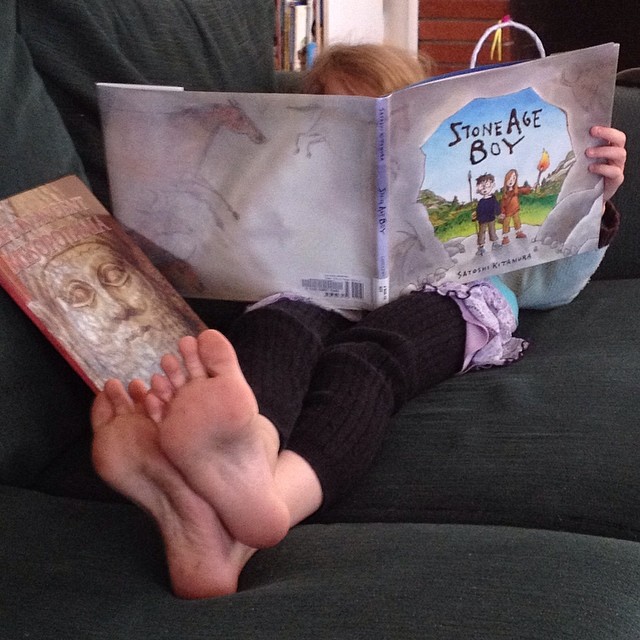
Books are easy. Books I log elsewhere. And yet the only book I entered at GoodReads in April was The Wheel on the School. Can that be right? It’s true I went into one of my periodic reading lulls after my ravenous appetite in March. That’s become my pattern, it seems: a feverish binge and then a (usually sudden) inability to settle on anything, a stretch of weeks when I reach for crossword puzzles instead of a book at bedtime.
I think I needed time to digest after the rich feasts of March!
• The Remains of the Day, Kazuo Ishiguro
• The Blue Flower, Penelope Fitzgerald
• The Giver, Lois Lowry
• Queen of England: The Story of Elizabeth, Helene Hanff
• And my Forster binge: A Room with a View, Where Angels Fear to Tread, Howard’s End
With Rilla, The Secret Garden—we are a few chapters from the end. And the usual range of history, science, and poetry with Rose and Beanie, and picture books and beginning readers to my three youngest.
Poetry has been delightful; Herbert last week and Herrick and Marvel this week. Next week brings us to Milton, and to prepare, I’ve been watching these lectures at Open Yale. Extremely engaging. Milton’s one of my gaps. Never studied him formally, had only read bits and pieces, and knew him largely through quotes and references—especially Dorothea’s repeated comparisons of her Mr. Casaubon (shudder) to the esteemed poet. This lecture series has been wonderfully illuminating and I’m glad I finally stopped passing it by in favor of other courses.
Also re-read a good bit of Jane Eyre (for discussion with Rose) and watched this lecture on YouTube. I wish the professor had been credited; I’d like to seek out more of her work. Quite good.
Rose and I started off reading Gulliver’s Travels together but she surpassed me and I doubt I’ll catch up now that she’s finished. Gulliver isn’t quite what I want when my head hits the pillow after a crammed-full day.
Hang on! I read Miss Marple stories all through April! Huh, they aren’t showing up on my GoodReads list. Probably forgot to enter the date. Well, it was The Tuesday Club Murders, which I’d read before. I remember now: I had a cold, and Christie is always my go-to reading when I’m sick.
This week’s reading has included a lot of prep for a new endeavor of mine: now that Mystery Class is over, I’m going to do a six-week poetry workshop with my Journey North kids. Very excited about this. Starts tomorrow.
Of course, some of my most fascinating (and challenging) reading has been for my editing job—a delicious gig for a knowledge junkie like me. But it, too, contributes to my late-evening literary slothfulness. By ten o’clock, my brain is quite simply done with words—except the kind that fit one letter at a time into little boxes.
There’s never any knowing—(how am I to put it?)—which of our actions, which of our idlenesses won’t have things hanging on it for ever.
—E.M. Forster, Where Angels Fear to Tread
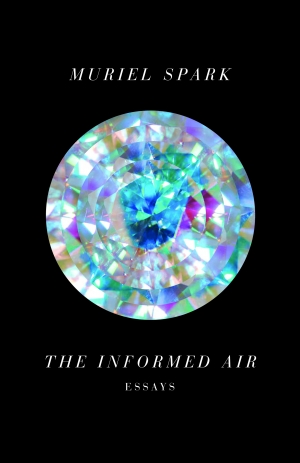
“I’ve never met a really good writer who lives in high style. I think a stylish life is unsuitable to the writer, and very often in the house where there’s a mild disorder one finds the writer with the best powers of organising his work. Order where order is due.”
Muriel Spark— “The Poet’s House”
Read this and many other wonderful essays by Muriel Spark in The Informed Air, which will be released by newdirectionspublishing on April 29th.
(Source: kevinelliottchi, via maudnewton)
(I’m counting the days until this book comes out!)
“No doubt it has happened to many of you to pick up in a happy moment some book or pamphlet or copy of verse which just says the word you have unconsciously been listening for, almost craving to speak for yourself, and so sends you off hot-foot on the trail. And if you have had that experience, it may also have happened to you that, after ranging, you returned on the track ‘like faithful hound returning,’ in gratitude, or to refresh the scent; and that, picking up the book again, you found it no such wonderful book after all, or that some of the magic had faded by process of the change in yourself which itself had originated. But the word was spoken.”
—from The Art of Reading by Sir Arthur Quiller-Couch
It occurred to me that I could use the voice-record feature on my phone to dictate a quote directly into Evernote. Then, later, when I’m back at my laptop, I can clean up the typos (voice recording always generates some gems) and paste the quote into my Tumblr, which, as I mentioned the other day, I’ve decided to try out as my commonplace book.
I’m still using my tumblr to collect other articles as well, but I’m using a tag to collect all the book quotes I want to hold on to. So far, I’m enjoying the process: the format encourages me to add my own thoughts below a quote, if I wish, but there’s no pressure.
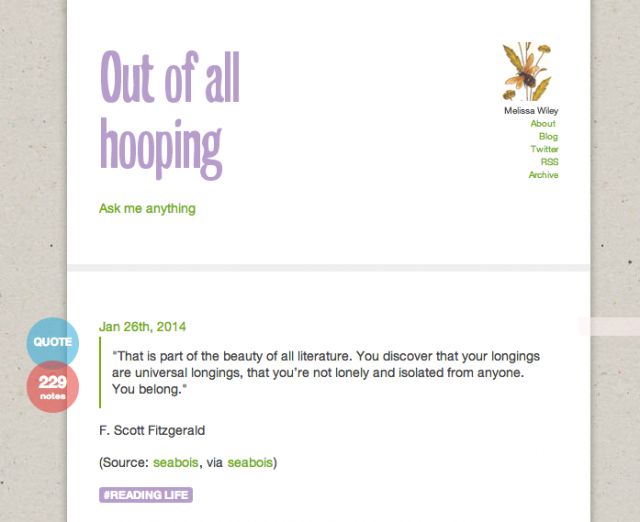
Bee avatar from Lesley Austin of Wisteria & Sunshine
Ryan Holiday on How And Why To Keep A “Commonplace Book”:
A commonplace book is a central resource or depository for ideas, quotes, anecdotes, observations and information you come across during your life and didactic pursuits. The purpose of the book is to record and organize these gems for later use in your life, in your business, in your writing, speaking or whatever it is that you do.
Some of the greatest men and women in history have kept these books. Marcus Aurelius kept one–which more or less became the Meditations. Petrarch kept one. Montaigne, who invented the essay, kept a handwritten compilation of sayings, maxims and quotations from literature and history that he felt were important. His earliest essays were little more than compilations of these thoughts. Thomas Jefferson kept one. Napoleon kept one. HL Mencken, who did so much for the English language, as his biographer put it, “methodically filled notebooks with incidents, recording straps of dialog and slang” and favorite bits from newspaper columns he liked. Bill Gates keeps one.
Not only did all these famous and great individuals do it. But so have common people throughout history. Our true understanding of the Civil War, for example, is a result of the spread of cheap diaries and notebooks that soldiers could record their thoughts in. Art of Manliness recently did an amazing post about the history of pocket notebooks. Some people have gone as far as to claim that Pinterest is a modern iteration of the commonplace book.
Fun to hear thoughts on this topic from someone outside homeschooling circles. Apart from a few quiet book bloggers, nearly everyone I know who is familiar with or interested in commonplace books is a homeschooler.
I’ve tried many interations of the practice over the years. (This recent Onion piece made me laugh, because I relate all too well to the feeling that just the right notebook and just the right pen will make, this time, all the difference—only re quote-keeping rather than creative writing.)
It’s always the copying out by hand that gets me. I bookmark quotes all over the place (via Diigo, Tumblr, or Evernote, depending on whether I want to share them, if indeed I want to share them at all). And I highlight the dickens out of the things I read on Kindle. But as methods go mine are pretty scattered—and, except for the Kindle highlights, only cover my internet reading. I’ve no single place to go to pore over passages that have struck me in, you know, books made of paper.
Mental Multivitamin has made a consistent practice out of commonplace-book-style blog posts for some ten years, recording quotes that struck her in the books she has read. Would that I had followed her example. The paper-loving side of me craves a handwritten version, but realistically I know myself (and my achy wrists) well enough to know that I would wind up with that dogeared stack of waiting books Ryan mentions in his post—the very thing he cautions you to avoid. Typing is always going to work better than writing, for me.
I wonder if I would keep up with a Commonplace Tumblr? Typing or pasting book quotes into that platform? Same principle, easier on the wrists. It would certainly be a steadier use of my tumblr than the haphazard link-collecting I do there. (My original vision for my tumblr back in 2009—good grief, has it really been that long?—was to collect links to all the reading I do online, or all significant reading, at least: a companion to my reading log. That didn’t pan out over the long haul.)
***
I began this post a couple of days ago and have since decided to give it a try. I’ve hit the reset button on my tumblr (figuratively) and am going to try to copy out book quotes into once or twice a month. It’s an experiment; I may lose steam after a while, but we’ll see.
(I could do it here instead, but when I post things here I feel more pressure—entirely self-imposed—to add my own commentary. Over there I don’t seem to mind tossing a quote onto the page and letting it speak for itself. Then, if I have more to say—as indeed turned out to be the case with the article above—I can bring it over here and expand upon it.)
***
While finishing up this post just now, I was amused to find “commonplace book” among my categories. I probably made a similar resolution years ago. Didn’t take, obviously.

 I’m a little vexed with myself over the Moomins, though. After a many-years stroll through the series, Huck and Rilla and I took up the final book, Moominvalley in November, last November (fittingly and deliberately). I hadn’t read that one before and it became one of my favorites, though it is markedly different from the rest of the series in tone and cast of characters. There were so many passages I wanted to share here. But a readaloud is the one time I can’t stop and make a note! I mean, I do occasionally, interrupting the narrative to ask Scott to Slack me a phrase—but I lose track of those messages and never seem to follow through on copying out the quote or noting a connection.
I’m a little vexed with myself over the Moomins, though. After a many-years stroll through the series, Huck and Rilla and I took up the final book, Moominvalley in November, last November (fittingly and deliberately). I hadn’t read that one before and it became one of my favorites, though it is markedly different from the rest of the series in tone and cast of characters. There were so many passages I wanted to share here. But a readaloud is the one time I can’t stop and make a note! I mean, I do occasionally, interrupting the narrative to ask Scott to Slack me a phrase—but I lose track of those messages and never seem to follow through on copying out the quote or noting a connection.After November, it was decided by unanimous vote that I should start all over again at the beginning of the series. Comet in Moominland was a deep delight—containing as it does Moomintroll and Sniff’s first encounter with Snufkin. Not to mention the Snork Maiden, her brother the Snork, and the Hemulen. It also contains the scene Rilla and I agree is the funniest in all the series: the visit to the small shop run by a kindly old lady. Snufkin tries on a pair of new trousers but decides to stick with his old ones (this is extremely Snufkin of him). The others’ purchases are tallied up—”That will be 20 3/4 pence altogether”—and that’s when they remember none of them is carrying a single penny.






